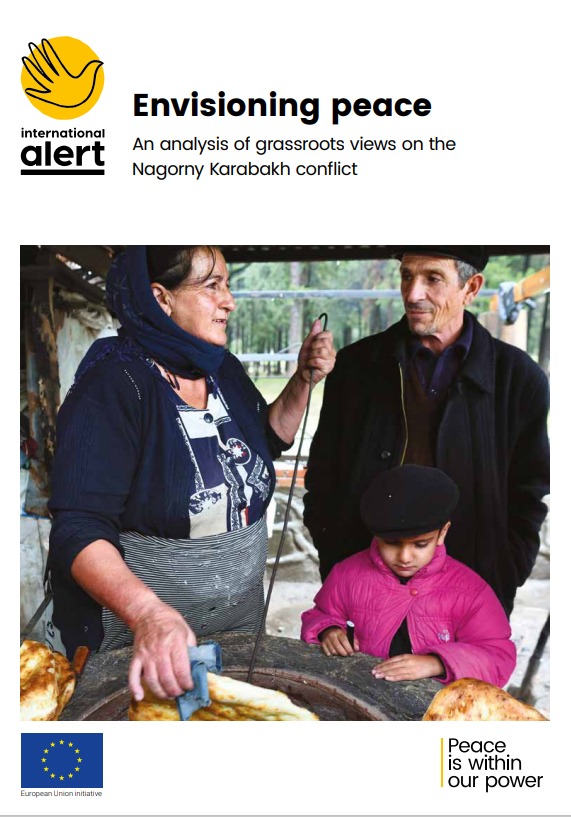
Envisioning peace: An analysis of grassroots views on the Nagorny Karabakh conflict
A sociological research study based on interviews with ordinary people in Azerbaijan, Armenia and Nagorny Karabakh.
Researching grassroots views on the Nagorny Karabakh conflict
Envisioning Peace was a sociological research project based on interviews with ordinary people in Azerbaijan, Armenia and Nagorny Karabakh. It was led by International Alert and aimed to discover grassroots insights that would help to:
Developing the methodology
A group of ten regional experts were identified to help develop the research methodology for the study. It was decided that the research would be qualitative study using an extensive questionnaire and in-depth, semi-structured interviews with representatives from different social groups. A key factor in the project was hearing the opinions of ordinary people. The study generated important insights into questions of identity, societal roles, myths and propaganda, and views about the prospects for peace.
The focus was on the human cost of conflict and peace, based on interviewees’ personal experience. The questionnaire also asked how their lives might have been different without the war, and what they as individuals could do for peace. The aim of this approach was to open up new perspectives and explore the potential in society as a whole to work for peace.
A research group of young people from Armenia, Azerbaijan and Nagorny Karabakh was established, who were trained in interview and research techniques. Against the odds – because prevailing attitudes made this challenging – the team at International Alert was able to engage them.
Interviews and analysis
11 researchers carried out interviews in Azerbaijan, including among internally displaced people, Armenia, as well as Nagorny Karabakh, aiming to reach a wide range of communities, locations and social groups. These took place between June and November 2017.
This was not always easy as there was a deep suspicion of research in some communities, particularly in rural areas, and many people were not willing to be interviewed. However, in total, the researchers conducted 110 interviews in 42 locations.
The regional experts provided written analysis of the interviews from their own societies. After the team drafted a report in April 2018, to be disseminated further. This process included public roundtable discussions in the region, as well as in the UK and Austria.
These have fed into a series of recommendations for peace negotiators and policymakers, including the need for both internal and cross-divide dialogue.
Although the results of this study confirm some widespread assumptions about the conflict, they also challenge stereotypes about the ways in which the conflict is perceived by people living in conflict-affected communities.
Popularisation of the report
The researchers were given the opportunity to do small projects (discussions, short films, photography projects) based around the findings of the research. As well as this, local partners organised discussions in the capitals and regional centres to discuss the findings of the research with local populations. Short videos were created by Alert to summarise the findings (in English) for a more international audience.
Photograph by Knar Babayan
I never met before this kind of research which will reflect the vision of common people living in this region. Second, it is really objective: it is not based on the official narrative, it is objective and balanced.Researcher
Individuals who took part in completing the survey were proud that their opinion was not neglected (they found their quotes in the publication). They were surprised that on the opposite side people have the same opinion.Researcher

A sociological research study based on interviews with ordinary people in Azerbaijan, Armenia and Nagorny Karabakh.